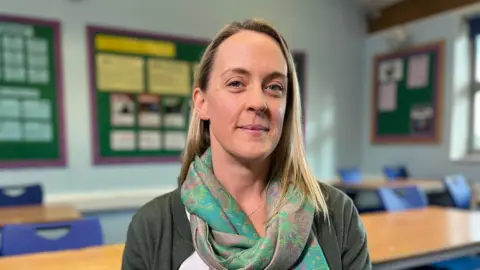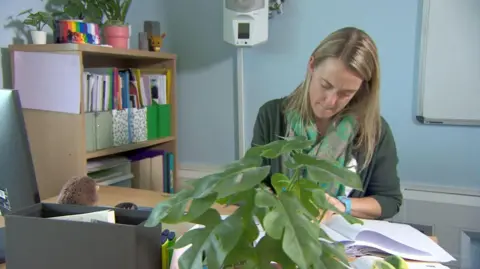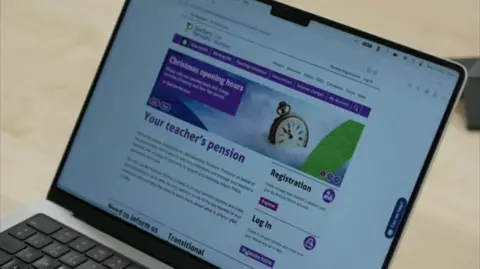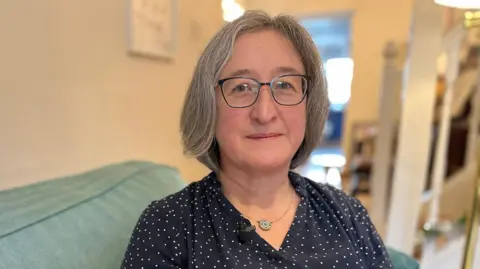 BBC
BBC“I thought I was done crying,” says teacher Amy Goldsmith.
“I’m two and a half years into my world having been turned upside down and I would very much like that to be over.”
Like hundreds of other teachers, Amy is stuck, unable to go ahead with her divorce because of long delays working out the value of her pension.
This is needed by the courts to decide whether it should be shared with her ex-partner, and without which it is almost impossible to reach a financial settlement.
“I was in limbo over my relationship and naively thought I could get the paperwork and move on,” she said.
“I’m now in another limbo and just feel totally impotent.”
Amy, 43, is waiting for the valuation from Teachers’ Pensions – which runs the teachers’ pensions scheme (TPS) on behalf of the Department for Education.
But it has been struggling to meet demand.
The government, which described the calculations as “extremely complex” and requiring a specialised role to complete, said it aims to clear most of the current backlog by the end of February.

A Freedom of Information request – submitted by a member of a teachers’ pensions CETV support group and seen by the BBC – suggests just under 2,000 teachers were waiting for CETV valuations at the start of December 2024.
The Department for Education said that number dropped to 1,344 as of 6 January 2025, but that new cases are always coming in.
Amy, from Bristol, teaches history, geography and psychology at a secondary school in Wiltshire.
She has been waiting since July 2024 for a document known as a Cash Equivalent Transfer Valuation, or CETV and can not get divorced without it.
‘Hugely stressful’
Both parties in a divorce need to provide accurate information about their finances – including any property, savings, and pensions – even if the split in assets is otherwise straightforward.
“I was initially told [the Teachers’ Pension Scheme] would be in touch within 10 working days,” she said.
“But then the person I spoke to said they had no timescale for the calculations to be completed. So holding my breath was not recommended.”
Amy feels that the delay is making a highly emotional situation much worse.
“I can’t have closure and get on with my life,” she said.
“You don’t wake up one morning and say, ‘Oh, we’ll get divorced’. I’ve been through the wringer. It’s been hugely stressful.”

David Quinton, from Gloucestershire, lectures in construction skills at a further education college. He first applied for his CETV in October 2023 and is still waiting, unable to get divorced without one.
He said: “This is the first time I’ve ever been divorced, so I hadn’t heard of [a CETV] before.
“It’s exhausting. It’s taken a toll on me mentally because I want to move on with my life and I’m sure my ex-wife wants to do the same. It’s financially taking a toll as well. I’m still paying a mortgage on a house.”
David has also racked up hundreds of pounds in solicitors’ fees because of the protracted divorce process.

He has written a series of complaints to the Teachers’ Pension Scheme and his MP, Simon Opher, has raised his case in parliament.
The Teachers’ Pension Scheme is one of the biggest in the country, with about two million members.
David said: “There are people mentally on the edge. They see no light at the end of the tunnel.
“The Department for Education have given us stock answers… and there’s been no offer of compensation.”
Complicated calculations
 Getty Images
Getty ImagesSteve Webb, former MP for Thornbury and Yate and pensions minister from 2010 until 2015, works at an independent pensions consultancy.
He said: “When a pension scheme works out what your pension is worth, it has to do some complicated calculations.
“But a court judgement means all these public sector schemes have to do some extra complicated calculations. They all need to agree so the teachers and the nurses and the civil service schemes all do it the same way.
“So that’s taken time to agree and then they need expert staff to actually do all of these calculations. All of that is just taking time.”
The judgement, also known as the McCloud pension remedy, found in 2018 that the government discriminated against younger members of public service pension schemes.
It resulted in the government making changes to public service pension schemes, and calculating valuations in a new way.
Backlog to be cleared
In an update issued on the Teachers’ Pensions website in December, the service apologised for the inconvenience caused by the delays.
It said they were due firstly to an embargo on new CETVs between March and July 2023 in order to take account of a change in the way valuations are made.
And once the backlog had built up, new rules came into force after the McCloud judgment meaning that in many cases two calculations were necessary rather than one.
The Department for Education said the delays are not a result of having too few staff and that it is working through cases in date order wherever possible.
It said it aims to clear the “majority” of the current backlog by the end of February 2025, apart from some “small groups”.
‘No support’

Music teacher Steph Collishaw, 53, from Frome, in Somerset, has been waiting for her CETV since May 2024.
“It’s made me feel really angry because I’ve worked for 29 years and have paid into the pension scheme all that time,” she said.
“But when I need to depend on information that is rightfully mine, it’s simply not there.”
She said her divorce proceedings have become drawn out and she is currently unable to remortgage as her husband’s name is still on the title deeds of her house.
And like many caught up in this delay, she has become sceptical of promises that things will improve quickly.
“I could be sitting here in another six months’ time, still waiting on my CETV and I have no idea if that’s going to happen or not.
“You’re just trying to live in a vacuum of information and there is nothing there to support you.”



